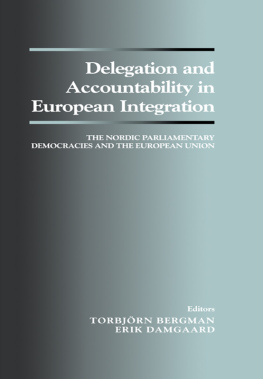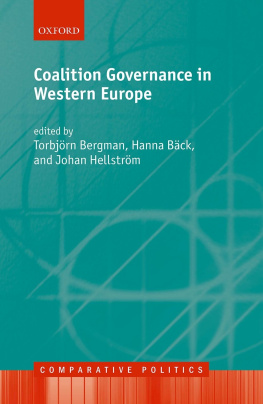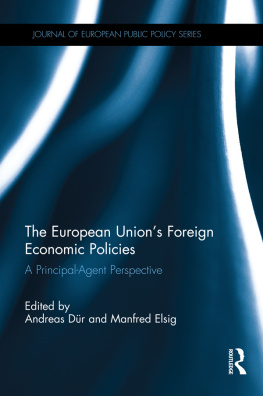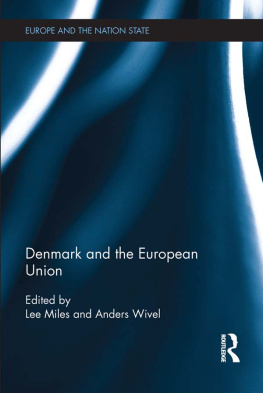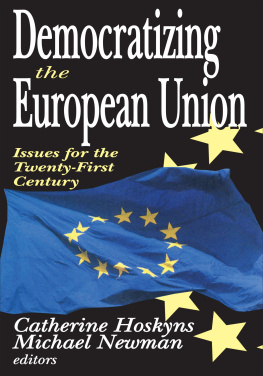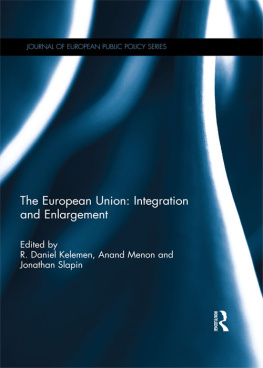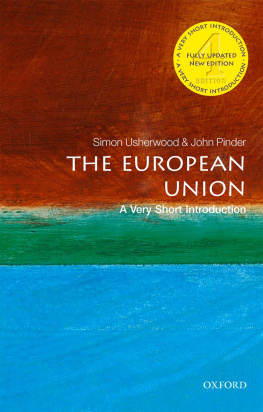DELEGATION AND ACCOUNTABILITY IN EUROPEAN INTEGRATION
THE LIBRARY OF LEGISLATIVE STUDIES
General Editor
Philip Norton
ISSN 1460-9649
A series of new and recent books exploring the role of legislature in contemporary political systems. The volumes typically draw together a team of country specialist to provide in-depth analysis.
Parliaments in Contemporary Western Europe
edited by Philip Norton
Volume 1: Parliaments and Governments in Western Europe
Volume 2: Parliaments and Pressure Groups in Western Europe
Volume 3: Parliaments and Citizens in Western Europe
The Uneasy Relationships between Parliamentary Members and Leaders
edited by Lawrence D. Longley and Reuven Y. Hazan
Parliaments in Asia
edited by Philip Norton and Nizam Ahmed
Conscience and Parliament
edited by Philip Cowley
The New Roles of Parliamentary Committees
edited by Lawrence D. Longley and Roger H. Davidson
Members of Parliament in Western Europe Roles and Behaviour
edited by Wolfgang C. Mller and Thomas Saalfeld
Parliaments in Western Europe
edited by Philip Norton
The New Parliaments of Central and Eastern Europe
edited by David M. Olson and Philip Norton
National Parliaments and the European Union
edited by Philip Norton
Delegation and Accountability in European Integration
THE NORDIC PARLIAMENTARY DEMOCRACIES AND THE EUROPEAN UNION
Editors
TORBJRN BERGMAN
ERIK DAMGAARD
 FRANK CASSLONDON PORTLAND, OR
FRANK CASSLONDON PORTLAND, ORFirst published in 2000 in Great Britain by
FRANK CASS AND COMPANY LIMITED
2 Park Square, Milton Park, Abingdon, Oxon, OX14 4RN
and in the United States of America by
FRANK CASS
270 Madison Ave, New York NY 10016
Transferred to Digital Printing 2005
Copyright 2000 Frank Cass & Co. Ltd
Website: www.frankcass.com
British Library Cataloguing in Publication Data
Delegation and accountability in European integration: the Nordic parliamentary democracies. (The library of legislative studies)
1. European Union Scandinavia 2. Representative government and representation Scandinavia 3. Scandinavia Foreign relations European Union countries 4. Scandinavia Politics and government
I. Bergman, Torbjrn II. Damgaard, E. (Erik) 320.9'48
ISBN 0 7146 5066 8 (hb)
ISBN 0 7146 8115 6 (pb)
Library of Congress Cataloging-in-Publication Data
Delegation and accountability in European integration: the Nordic parliamentary democracies and the European Union / editors, Torbjrn Bergman, Erik Damgaard.
p. cm. (The library of legislative studies, ISSN 1460-9649)
This group of studies first appeared in a special issue of Journal of legislative studies vol. 6, no. 1 T.p. verso.
ISBN 0-7146-5066-8 ISBN 0-7146-8115-6 (pbk.)
1. Scandinavia Politics and government 1945 2. Delegation of powers Scandinavia. 3. Responsibility Scandinavia. 4. European Union Scandinavia. I. Bergman, Torbjrn. II. Damgaard, Erik. II. Series.
JN7011 .D46 2000
328.480749 dc21 00-020072
This group of studies first appeared in a Special Issue of Journal of Legislative Studies (ISSN 1357-2334), Vol.6, No.1 (Spring 2000), [Delegation and Accountability in European Integration].
All rights reserved. No part of this publication may be reproduced, stored in a retrieval system, or transmitted in any form, or by any means, electronic, mechanical, photocopying, recording or otherwise without the prior written permission of Frank Cass and Company Limited.
Contents
Torbjrn Bergman
Arthur Lupia
Erik Damgaard and
Asbjrn Sonne Nrgaard
Tapio Raunio and Matti Wiberg
Hans Hegeland and Ingvar Mattson
Svanur Kristjnsson and
Ragnar Kristjnsson
Hanne Marthe Narud and
Kaare Strm
Erik Damgaard
Introduction: Delegation and Accountability in European Integration
TORBJRN BERGMAN
The overall question of this volume is how the European Union (EU) effects national decision making in the Member States. This question has to do with both change in progress and with the future of democracy in these countries. Our approach to studying how democratic decision making is changing involves three very important choices. One is that rather than studying bits and pieces of EU impact, we examine the whole chain of national democracy from voters to civil servants. Second, we study this chain from a particular theoretical perspective a principal-agent-based delegation and accountability perspective. Third, we focus on a particular set of countries, the Nordic parliamentary democracies.
One aspect of EU membership is that domestic decision makers interact with their European counterparts and make binding decisions in supranational (as opposed to international) institutions.1 Analyses of the effects of this process have often concluded that national-level democracy is becoming increasingly more complex and diffuse. Albert Weale has very aptly summarised the main argument: there has been a reduction of the degree of policy control by individuals within member states; an intrusion of the EU into functions that were previously performed by the nation state; a weakening of legislative control over the executives within nation states; and an overall lack of democratic accountability and transparency.2 These
_______________
Torbjrn Bergman is a post-doctoral research fellow in the Department of Political Science at Ume University, Sweden
The contributors to this volume gratefully acknowledge the Bank of Sweden Tercentenary Foundation's support to Torbjrn Bergman and the research programme on Constitutional Change and Parliamentary Democracy (1996:0801). Torbjrn Bergman, Wolfgang C. Mller, University of Vienna, and Kaare Strm, University of California, San Diego, head the programme.
Bergman would like to thank the other contributors to this volume for their help with both the introduction and the volume. He would also like to thank Magnus Blomgren and Thomas Larue for research assistance and Cynthia Kite for help with language editing. As agents, they all prove the high value of careful ex ante screening.
findings pinpoint important aspects of the impact of EU membership on national democracy. However, this volume is not about gloom and doom with regard to the consequences of the EU for national democracy. Instead, our main working hypothesis is that the transfer of power from the national level to the supranational does not necessarily mean that delegation fails or that there is a reduction in accountability at the national level. While it is true that membership transfers significant authority to EU institutions, the precise impact is multifaceted and open-ended and should be assessed through empirical studies. In some instances, supranational integration might actually reduce the agency loss that can potentially arise in all relationships between (domestic) principals and agents. With this rather open point of departure, our approach leads us to undertake a careful assessment of the pros and cons of the EU impact.
Rather than claiming that we present the final verdict about the EU's impact on national-level democracy, we want to stress that our answers are preliminary and exploratory. Having said this, however, it is also important to point out that the contributors provide state-of-the-art accounts of the consequences for the Nordic parliamentary democracies. The contributors share a clear focus, a common starting point and a coherent conceptual apparatus. It should also be noted that we are interested in domestic adaptation and institutional innovation rather than in a notion of change rooted in mechanical and/or deterministic causality. It is for this reason that we adopt a principal-agent perspective and focus specifically on matters concerning delegation and accountability.

